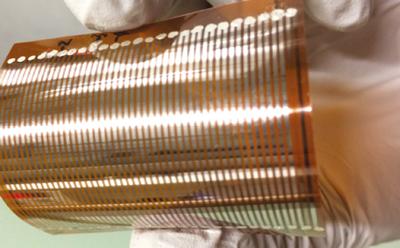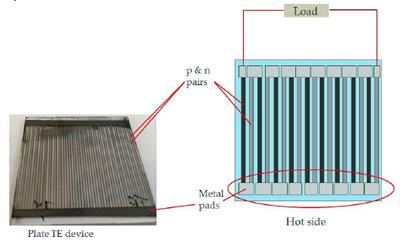Thermoelectric materials

We have developed deposition and fabrication capabilities for structured BiTe (bismuth telluride) films and scalable devices, and demonstrated energy conversion from heat to a measurable voltage proportional to the temperature. Our technology provides an advantage over conventional bulk structures, being based on thin films on low-thermal conductivity substrates. A conventional BiTe semiconductor thermoelectric device is typically 5mm thick. Our approach, shown below, is based on thin films of the same BiTe materials but only 150 microns in thickness. We are now in the process of testing thinner, lower-conductivity ceramic substrates as an alternative to the glass which is currently used, including flexible substrates. Our approach will allow individual devices to be stacked, enabling a much larger set to be created in series or parallel and significantly increasing efficiency. Alongside our BiTe device work, we are also now evaluating new materials for thermoelectric power generation, in particular improving efficiency through increasing the temperature range at which these devices can be operated.
Technological advantages of chalcogenide based thermoelectrics
- Demonstrated higher thermal stability providing energy harvesting over a larger temperature range
- Use of low-cost, earth abundant materials
- Thin film design and can be applied to flexible substrates
- Stacking of thin films provides scalable output
Technology Roadmap
2004 – First demonstration of electronic application of chalcogenides in our labs (EPSRC funded)
2011 – Commence program to dope chalcogenides to create n-type and p-type seminconductors
2012 – First demonstration of carrier reversal through ion implantation in a chalcogenides (EPSRC funded)
2014 – First demonstration of thermoelectric power generation in a new family of chalcogenides (patent pending)
Collaboration opportunity
We are looking for partners who can contribute application-driven requirements, for example in the aerospace, automotive and rail industries, where there are opportunities for large-scale applications in power generation through harvesting heat excess.
If you would like to know more, please contact Professor Dan Hewak dh@orc.soton.ac.uk or Dr Jin Yao J.Yao@soton.ac.uk
Website: www.orc.soton.ac.uk/ngaf.html
Other University of Southampton sites
